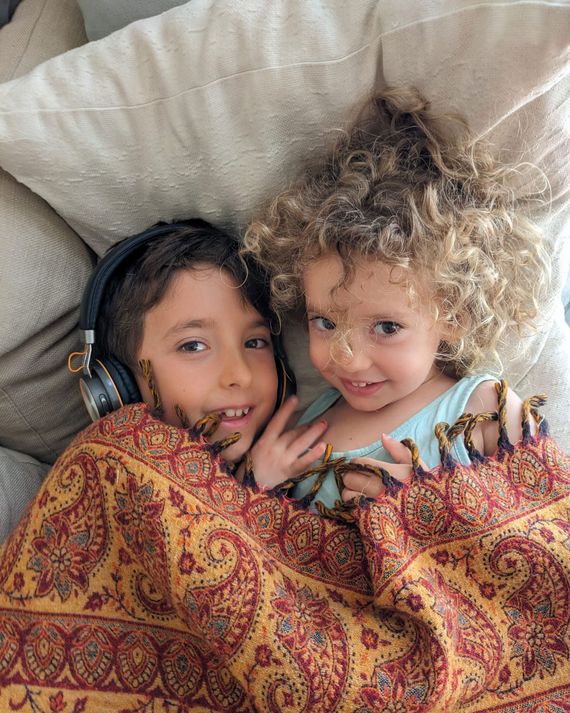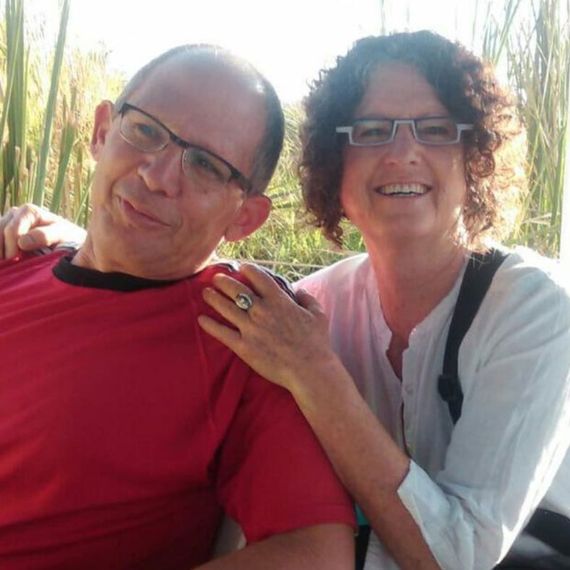
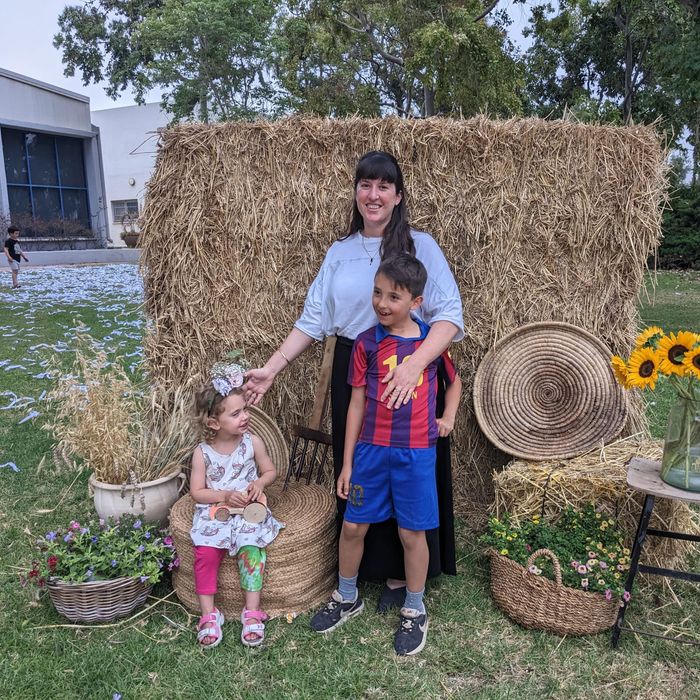
Shaked’s sister Adi and her two children, Yahel Neri and Naveh, at Kibbutz Be’eri.
Photo: Courtesy Shaked Haran
On Saturday, October 7, 2023, as rockets fell near her home in the southern city of Be’er Sheba, Israel, Shaked Haran, a 34-year-old attorney, went into her house’s fallout shelter with her partner and two young children. She emerged to learn that ten of her family members had gone missing in Hamas’s attack on Kibbutz Be’eri, a small community near the Gaza border founded by her grandparents where an estimated 120 people were killed that day. Haran’s missing family, now believed to be hostages, range in age from 3 to 65 and include her parents, her sister and brother-in-law and their children, two aunts, an uncle, and a cousin. Eight of them had gathered at Haran’s parents’ home for the Jewish holiday of Sukkoth. The remains of Haran’s uncle’s caretaker, Paul Vincent, were later found in the fields near the kibbutz. Haran spoke to Irin Carmon on October 16.
This story is being republished on October 7, 2024.
On Saturday, Sunday, we were completely in the dark. I didn’t have my cell phone in the shelter in my home. My brother was in the far south of Israel and heard about everything that was going on and tried to contact my parents. They texted him that they were in the shelter. But at some point, around 10:30 a.m. or so, my father wrote him that they’re in big trouble and that they love us.
They were still evacuating people from the kibbutz all throughout these days. There was no one to call because they were still in the midst of fighting. We saw people texting that they were still under fire, or they were waiting for evacuation. It wasn’t like something ended and now people were trying to understand what happened. It was still really live.
On Sunday we learned that a good friend of my father called him on Saturday over a hundred times. Eventually someone answered in Arabic and shouted “hostage, hostage!” “Hamas Gilad Shalit” or “Gaza,” I don’t remember the precise words. Another witness saw my sister’s husband being taken in a truck to Gaza and took video. He managed to escape, the witness who talked to us, when they reached the border. He jumped off the truck.
The beginning, the first two days, I was a wreck. I’m 30 weeks pregnant, and I was really worried that it would affect the pregnancy. I couldn’t eat. I couldn’t sleep. I was crying. I was just crying in waves. I really worried about it. And my partner tried to tell me, “Okay, there are things you can still keep safe and your baby is one of them, so let’s try to do that.” I try to tell myself, “Okay, what I have in my hands, I should hold very strongly.” I have also two children at home who are almost 4 and almost 2. We didn’t tell them specific details. They saw me collapse completely. Also for them, I’m trying to hold onto some good things in this reality, but it’s very difficult.
Naveh and Yahel Neri, age 8 and 3.
Photo: Courtesy Shaked Haran
We saw videos of my parent’s house completely burnt down, almost nothing left. I grew up in that house. My mother was born in the kibbutz and lived there her whole life. My grandparents founded the kibbutz in 1946, before the state of Israel was founded. It was a very Zionist intention to live upon this land and to do it as peacefully as possible, but to be there. I think the same way. This is part of our country. We believe that we have the right to be here and we do want to live here in peace, but we are here.
My parents committed their life to this community. My father is an economist and manages the finances of the kibbutz. My mother is a scientist. She has a doctorate in biotechnology in plants. She founded and is currently president of an organization called FairPlanet, which provides training and high-quality vegetable seeds to small farmers in Ethiopia and Tanzania. And my sister, she’s a psychologist. She’s one of the most gentle, loving, caring people that I know. She is an amazing mother that has tried to do everything to keep her children out of the crazy reality in Israel. That was one of the reasons she left the kibbutz. She was living in the kibbutz until two years ago, maybe three, I don’t remember. She left partly because of the security situation. To think that she was there with her children, it blows my mind because she really tried so hard to have the best place for them. So that breaks my heart.
My aunt and her cousin and my cousin, her daughter, that were with them are also a really big part of the family. They also loved coming to the kibbutz and spending time together. My aunt and uncle are also peace activists in the region. It’s really absurd to think about it. Not that I think it matters who the people are. I don’t mean to imply that if you have a different view, then it’s okay to take you hostage. It’s just to get a feel for these people. They really saw the other side.
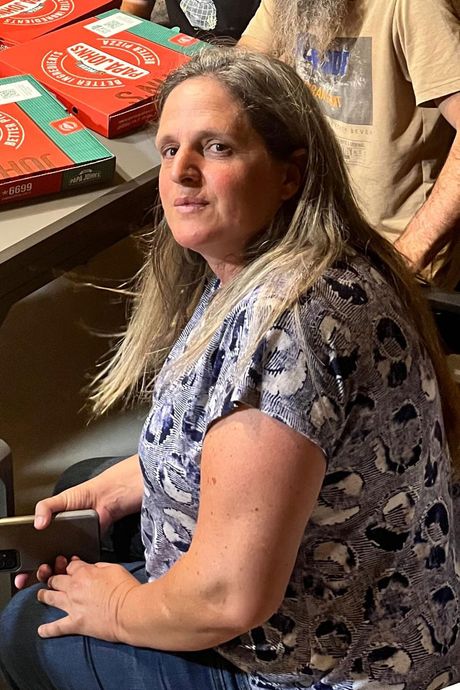
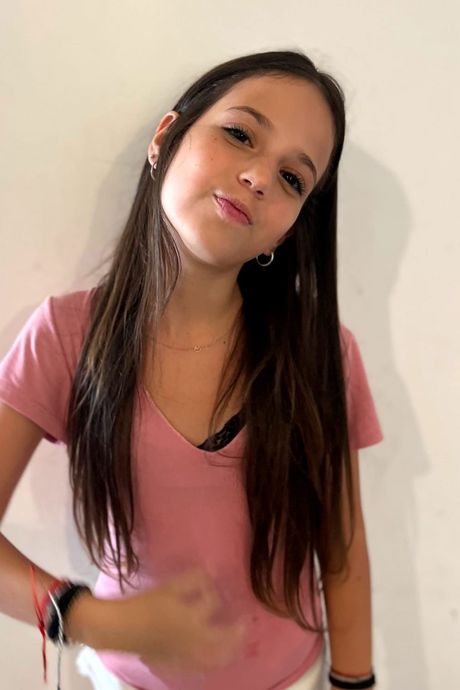
Shaked’s aunt Sharon Avigdori (left) and Sharon’s 12-year-old daughter, Noam (right). Photos: Courtesy Shaked Haran.
Shaked’s aunt Sharon Avigdori (left) and Sharon’s 12-year-old daughter, Noam (right). Photos: Courtesy Shaked Haran.
Growing up in this community, we heard bombs fall in Gaza. It was something that shook us as well. We were raised to have a lot of empathy and to be very concerned with the reality in Gaza. There were Palestinian workers in the kibbutz. After they couldn’t come anymore because of the security risk, the kibbutz kept sending them money to help their families. We didn’t feel like the people there were our enemies. We do feel like Hamas is the enemy and we’ve known that for many, many years. But we tried to make a clear difference between Hamas and the citizens.
My parents, it wasn’t a question for them to stay. They said, “Okay, this is our home. This is where we are. We really, really hope to live here in peace. But we’re not going to be scared out of our house.” We had discussions about it all the time. No one thought this scale of catastrophe could happen. But they saw the importance of staying there, and living there, and having their strong community, and sending out the message that “We are here.” They weren’t agnostic to it. It was their point of view.
Right away I got so many offers for social workers, psychologists, supporters, money, whatever. People were all over trying to do something to help other people. Officially, only yesterday we got an official message. It had been eight days. But really, they have never dealt with such a catastrophe and so many missing people. They didn’t want to give any official status or information before they knew what’s going on. We don’t feel left alone.
Shaked’s mother and father, Avshalom and Shoshan.
Photo: Courtesy Shaked Haran
It’s surreal now, I would say. It’s very chaotic, and we’re trying to be very practical and think of everything we can do to put pressure, to get information, to get the message out that our family and all the hostages should be released. But it’s really hard to hold on in this reality. Nothing is clear. Nothing is certain.
I understand that this government has all sorts of viewpoints that I am not a part of. As much as I would like to have comfort or some declaration from them, I’d much rather them be dealing with the actual situation. I don’t know if they are, because I have no idea.
Every turn that this war takes worries me. That’s why I don’t look at the news, because it’s a circus of blood and I feel like it won’t give me anything. It’s not that I’m waiting for Israel to do this step or another step, and then I’ll say, “Oh, okay, that’s better.” I have no way of knowing what’s better for my family right now. I don’t know strategically what they should be doing, but I really, really hope that whatever it is, the hostages are the top priority. If you look at my kibbutz and all the people that are missing and were abducted, you see mostly elderly people, women, and children. We have no idea where they are now. It can’t be treated like just a regular part of the Israeli-Palestinian conflict.
I really believe that if there are organizations or countries that want to take action, countries like Norway or Switzerland that have direct communication with Hamas through humanitarian aid, they can do it. It’s a matter of priority. I mean, there’s a lot of empathy. There’s a lot of interest. But there isn’t any action. We’re eight days into this situation. No one has acted. Maybe behind the scenes. But still, nothing has happened.
Source link

